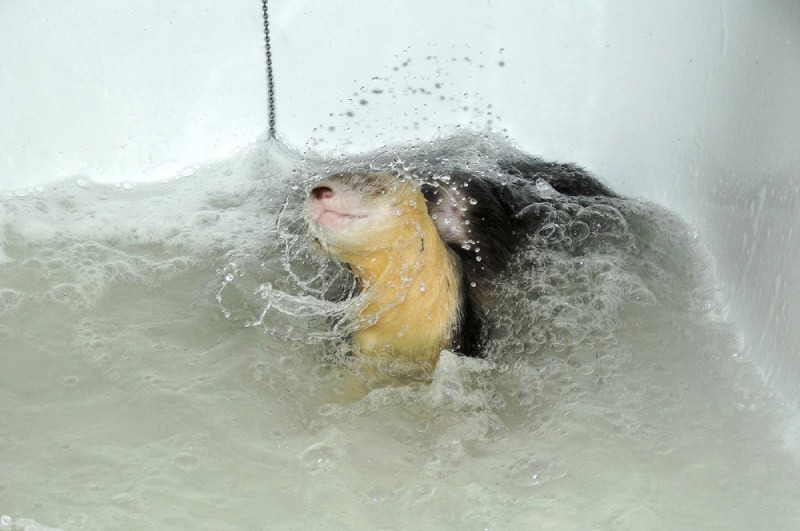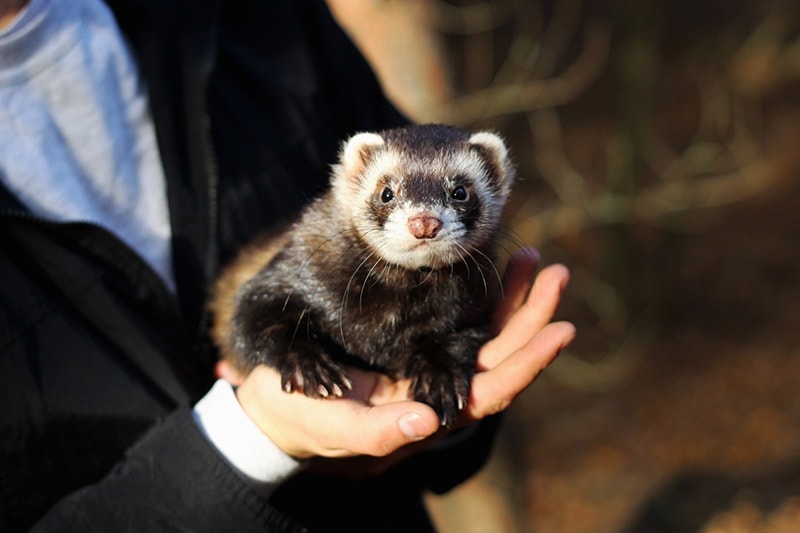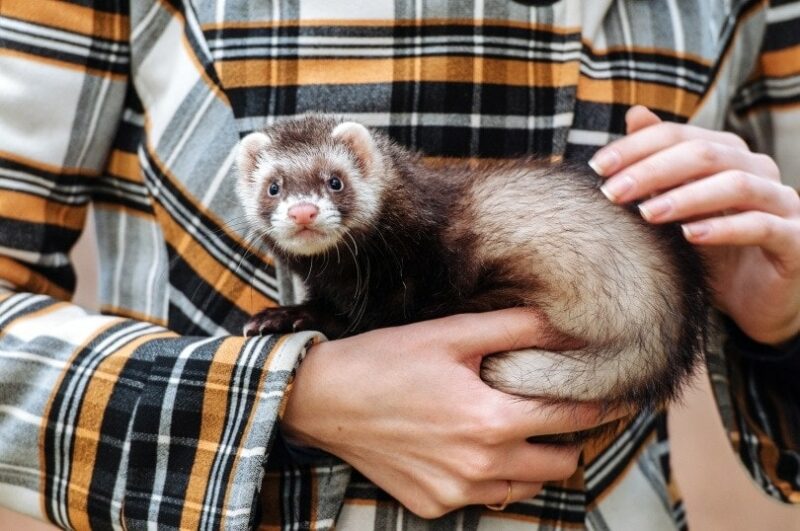Do Ferrets Hibernate? Vet-Reviewed Reasons, Behavior & FAQ
Updated on
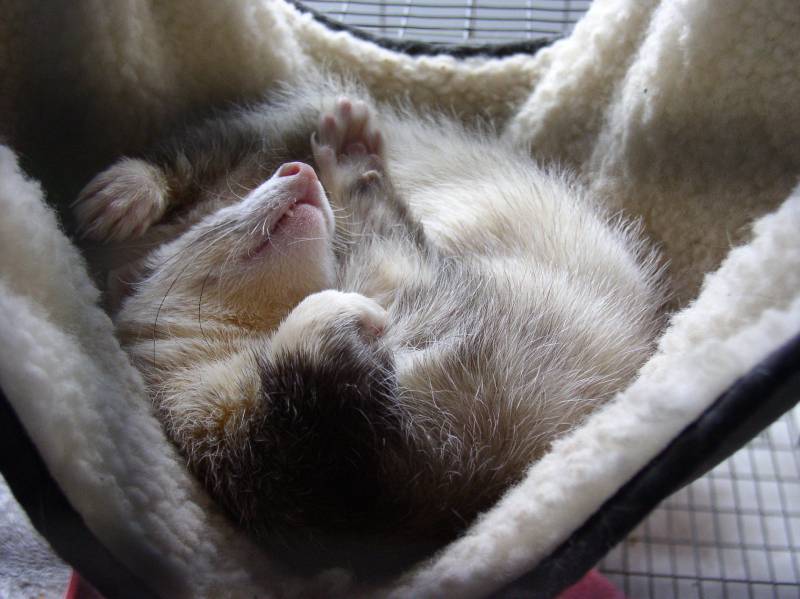
Ferrets are domesticated polecats known for their elongated bodies and quirky behaviors. One of their quirkiest behaviors which can be concerning for new ferret owners is their ability to enter a deep sleep. This deep sleeping state is often referred to as a “dead sleep” because it is difficult to wake them up from it. Some ferret owners might mistake their ferret’s deep sleep for hibernation, but it is not. Actually, ferrets do not need to hibernate because they have no reason to.
Read on below to find out more.
About Ferret Hibernation
Let’s discuss below what hibernation is and whether ferrets are included in the list of animals that do it.
What Is Hibernation?
Hibernation is the state of reduced activity and metabolic functions to conserve energy. It is done by endothermic animals to survive extreme weather conditions where resources like food and water are scarce. Various animals rely on hibernation for survival, including— groundhogs, ground squirrels, and European hedgehogs.
When an animal hibernates, they are not just entering a deep sleep. Instead, they are slowing down different metabolic functions such as their heartbeat, breathing, and body temperature. This allows them to conserve their energy to survive, and they are not in a normal state of sleep. Their body is going through processes that are not typical of a sleeping animal. Hibernation can last for several weeks to months, and the duration will depend on the species, temperature, and the animal’s overall health.
Before most animals hibernate, they will prepare for the long dormancy weeks before by eating plenty of nutritious food for fat storage. Animals will visibly slow down and stop certain bodily functions like defecating before hibernating.

Can Ferrets Hibernate?
No, ferrets do not hibernate because they have no reason to. They are domesticated animals that are not found in the wild, but theories suggest they are descendants of European polecats (Mustela putorius). The European polecat does not hibernate either and survives the colder winters by spending more time in their dens than in summer.
Ferrets are pets with no biological instinct to hibernate to survive extreme weather conditions because your house is unlikely to get to that point. Your home is probably at a comfortable temperature even during extremely cold or hot weather. Still, it is important to keep your ferret at a comfortable temperature range between 60 to 80 °F (15.6 – 26.7 °C).
Do Ferrets Go into Torpor?
Torpor is a short-term involuntary state of slowed metabolic rates different from true hibernation, although the two are often confused. Similar to hibernation, animals will enter torpor to survive unfavorable weather conditions and a lack of food. European hamsters and hummingbirds are examples of animals that go into torpor, but a ferret is not. Ferrets do not go into torpor, even if their food availability is scarce.
Do Hybrid Ferrets Hibernate?
Hybrid ferrets are crossbred between a domesticated ferret and a European polecat. The resulting offspring is sterile, so they cannot reproduce. Both the European polecat and domestic ferret do not hibernate, so neither does their hybridized offspring.

Why Do Ferrets Sleep So Much?
Many ferret owners can attest to their ferret’s love for sleep. Ferrets are nocturnal or crepuscular animals that are awake during dawn, dusk, and only sometimes during the day. This means that ferrets will spend a good portion of their day sleeping, often for 16 to 20 hours. Ferret kits generally sleep for longer, sometimes for 22 hours a day. Sleep is vital for their health, so do not try to prevent your ferret from sleeping for long periods.
When ferrets are sleeping, they enter a period of deep sleep where they are unresponsive to the outside world. This is often called a “dead sleep” because ferrets might appear dead during this sleep.
Ferrets can be picked up, moved, taken outside, or experience loud noises without waking up in a dead sleep. This deep sleeping state can last around half an hour to an hour long, and it is completely normal for ferrets.
It is not a sign that your ferret is too cold or hibernating, so do not try to warm your ferret to wake them. Ferrets are more sensitive to heat than they are to cold because they cannot sweat to cool themselves down.
When to Be Concerned
It is not concerning for ferrets to become slightly less inactive in cold temperatures or enter a deep unresponsive sleep every day. However, there are some situations where a ferret’s behavior can be concerning.
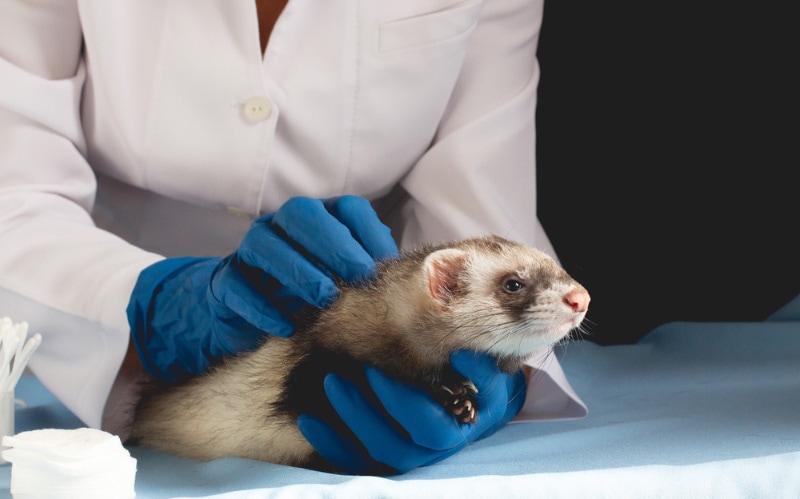
You should call your ferret’s vet if you notice the following signs:
- Diarrhea
- Lethargy
- Nasal or eye discharge
- Lack of appetite
- Drooling
- Sneezing
- Missing fur, teeth, or nails
Another concern for ferrets is hypothermia, which occurs when their core body temperature drops too low. Ferrets typically become hypothermic after anesthesia (usually for surgeries). A hypothermic ferret does not hibernate, and usually, your pet will be monitored at the veterinarian’s clinic or hospital to ensure their temperature stabilizes before they are discharged.
Conclusion
Ferrets do not hibernate or go into torpor because they have no reason to. However, some anecdotal evidence suggests that they may sleep a bit longer during the colder months than in summer. They generally sleep for up to 20 hours a day and become more active during the evenings and at night. Ferrets are more tolerant to cold temperatures than warm ones because they do not sweat like humans do.
Furthermore, ferrets have no biological instinct to hibernate like some other animals in poor weather conditions and food scarcity. It is normal for ferrets to enter a deep and unresponsive sleep for up to an hour, but it is not a sign that your ferret is hibernating.
Featured Image Credit: Couperfield, Shutterstock


